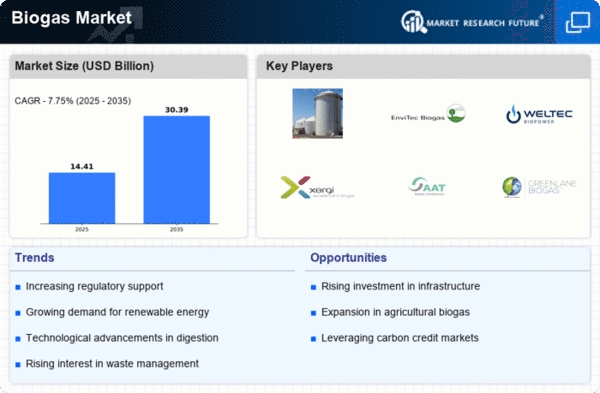Top Industry Leaders in the Biogas Market
*Disclaimer: List of key companies in no particular order
Top listed global companies in the Biogas industry are:
Agrinz Technologies GmbH
Air Liquide
DMT International
Gasum Oy
HomeBiogas Inc
PlanET Biogas
Scandinavian Biogas Fuels International AB
Schmack Biogas Service
Total Xebec Adsorption Inc
Bridging the Gap by Exploring the Competitive Landscape of the Biogas Top Players
The burgeoning biogas market, fueled by rising environmental awareness and energy security concerns, is a hotbed of competitive activity. Established players and nimble startups alike are vying for market share, employing diverse strategies and catering to distinct market segments. To navigate this dynamic landscape, understanding the key trends, player strategies, and factors influencing market share analysis is crucial.
Key Player Strategies:
Technology Innovation: Leading companies like Wartsila, EnviTec Biogas, and Air Liquide are investing heavily in R&D to develop advanced technologies. This includes optimizing biogas production processes, improving storage and purification techniques, and exploring innovative applications like biomethane production for transportation.
Market Diversification: Players are expanding their reach beyond traditional biogas applications like power generation and heat production. Targeting new segments like biogas upgrading for vehicle fuel, integration with anaerobic digestion in wastewater treatment plants, and biogas-powered combined heat and power (CHP) systems is creating new avenues for growth.
Strategic Partnerships: Collaboration is key. Partnerships with waste management companies, agricultural cooperatives, and energy utilities are facilitating access to feedstock, streamlining project development, and ensuring offtake agreements, all of which are vital for project viability.
Regional Focus: Companies are tailoring their strategies to suit regional dynamics. In Europe, stricter emission regulations and feed-in tariffs are driving rapid market growth, while in developing countries, the focus is on promoting affordable biogas solutions for rural communities.
Factors for Market Share Analysis:
Project Portfolio: The number, size, and geographical distribution of biogas projects undertaken by a company are indicative of its market presence and execution capabilities.
Technology Portfolio: The diversity and efficiency of a company's technology offerings, particularly in areas like high-solid digestion and waste-to-energy solutions, can give them an edge.
Financial Performance: Revenue, profitability, and access to capital are crucial for scaling operations and expanding market share.
Brand Reputation: A strong brand associated with reliability, sustainability, and expertise can attract investors and project developers.
Government Relations: Building strong relationships with policymakers and regulatory bodies can influence market regulations and secure favorable project financing.
New and Emerging Trends:
Biogas Upgrading: Converting biogas to biomethane with a high methane content is gaining traction, enabling its use as a transportation fuel and paving the way for carbon-neutral fleets.
Waste-to-Energy Integration: Companies are exploring the integration of biogas production with waste management facilities, transforming organic waste into a valuable resource.
Decentralized Biogas Systems: Smaller, modular biogas plants are becoming increasingly popular for rural communities and on-site energy generation, offering flexibility and affordability.
Digitalization and Automation: Adoption of digital technologies like AI and IoT for optimizing biogas plant operations, improving efficiency, and facilitating remote monitoring is on the rise.
Overall Competitive Scenario:
The biogas market is witnessing a healthy mix of competition and collaboration. Established players leverage their experience and financial muscle, while startups offer innovative solutions and agility. The focus is shifting towards diversification, technology advancements, and catering to specific market segments. Sustainability remains a key driver, with companies emphasizing the environmental benefits of biogas alongside its economic viability. As regulations become more stringent and public awareness grows, the competitive landscape is expected to become even more dynamic, presenting exciting opportunities for players who can adapt and innovate effectively.
In conclusion, the biogas market is a rapidly evolving space with immense potential for growth. Understanding the competitive landscape, key player strategies, and emerging trends is crucial for stakeholders seeking to capitalize on this burgeoning market. By focusing on innovation, diversification, and sustainable solutions, companies can not only secure market share but also contribute to a cleaner and more energy-secure future.
Latest Company Updates:
Agrinz Technologies GmbH:
- October 26, 2023: Announced partnership with EnBW Gas for biogas plant design and construction in Germany (source: Agrinz press release).
Air Liquide:
- December 15, 2023: Signed agreement with WasteFuel to develop and operate biomethane projects in France (source: Air Liquide press release).
DMT International:
- January 12, 2024: Secured contract for biogas plant expansion in the Netherlands (source: DMT International website).
Gasum Oy:
- January 10, 2024: Announced plans to build a new biogas plant in Finland, using waste from fish farms (source: Gasum press release).
HomeBiogas Inc:
- November 15, 2023: Received funding from IKEA Foundation to expand its biogas digester production in India (source: HomeBiogas press release).










